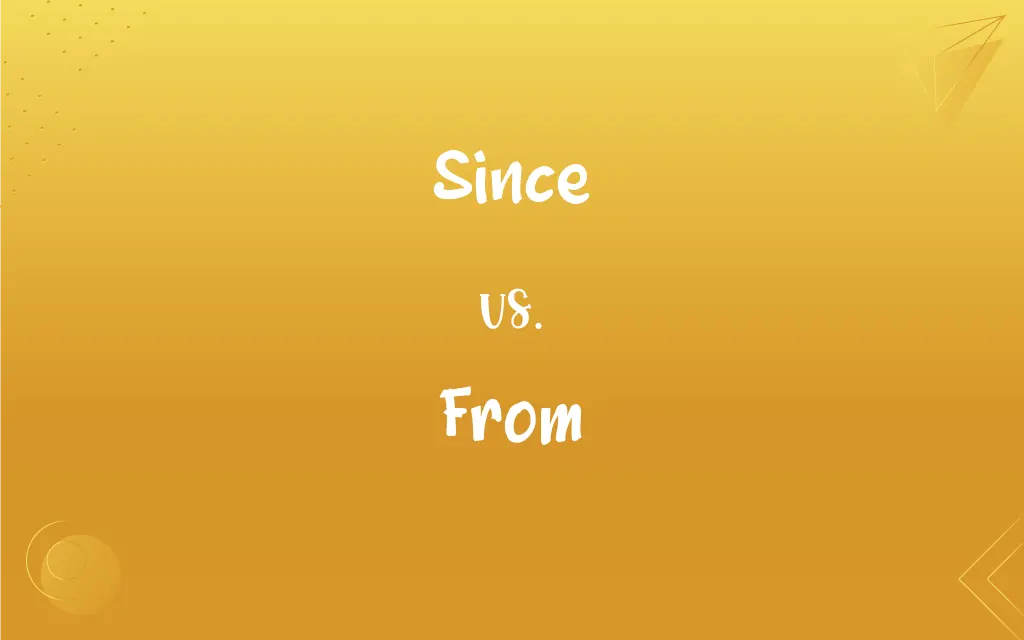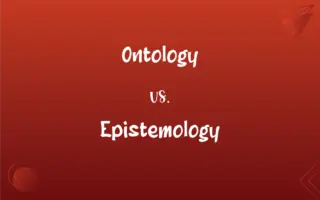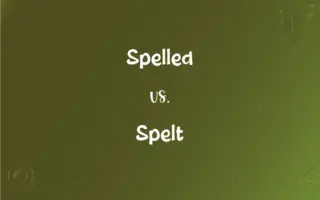Since vs. From: What's the Difference?
Edited by Janet White || By Harlon Moss || Updated on October 18, 2023
"Since" refers to the start time of an ongoing event, while "from" indicates the starting point of a range.

Key Differences
"Since" and "from" are both prepositions, yet they serve different grammatical functions in a sentence. "Since" is predominantly used to indicate the starting point of a time frame up to the present or another specified point in time. For instance, "I've been studying since morning." On the other hand, "from" is employed to denote the beginning of a range, which can be in terms of time, space, or other measures. For example, "The exhibition runs from Monday to Friday."
In contexts related to time, "since" usually indicates a point in the past after which an action or situation continues or has an effect. Consider the sentence: "She's been gone since Tuesday." Here, the action (being gone) began on Tuesday and has continued until now. In contrast, "from" sets the initial boundary of a duration or sequence. If we say, "She'll be gone from Tuesday to Friday," it establishes a specified period during which she'll be away.
Geographically or spatially speaking, "since" isn't typically used, but "from" marks a starting point or origin. While you might say, "I come from New York," you wouldn't typically use "since" in such a context. "From" provides a sense of beginning, origin, or source in numerous scenarios.
Both "since" and "from" can be used in contexts beyond just time and place. For instance, "from" might indicate the reason or cause: "He's suffering from a cold." "Since" can sometimes be used to suggest causality, although in a more nuanced manner: "Since you're here, we can start the meeting." Both prepositions help structure the relationship between different elements of a sentence, yet their applications differ markedly.
Comparison Chart
Time Reference
Point after which an action continues.
Beginning of a duration or sequence.
ADVERTISEMENT
Example (Time)
"I’ve been working since morning."
"The show runs from 9 am to 5 pm."
Spatial/Geographical
Not typically used.
Marks a starting point or origin.
Example (Spatial)
N/A
"I travelled from New York to LA."
Indicating Cause/Reason
Sometimes (e.g., Since you're here...)
Often (e.g., He's suffering from cold.)
Other Applications
Conveys a sense of causality.
Establishes the start of a range.
ADVERTISEMENT
Since and From Definitions
Since
Continuously from a past time until now.
I've known him since 2010.
From
Indicating the starting point in space or time.
I walked from the station to the office.
Since
Point in time after which something happens.
She hasn't called since yesterday.
From
Indicating separation or removal.
Take it from my bag.
Since
Because; considering that.
Since you’re not ready, we'll leave without you.
From
Indicating the source or origin.
This cheese is from France.
Since
Following a past event.
She's been happier since getting the new job.
From
Indicating the material something is made of.
The sculpture is made from clay.
Since
After a time in the past.
It's been years since we last met.
From
Indicating a cause or reason.
He's recovering from an illness.
Since
From then until now or between then and now
They left town and haven't been here since.
From
Used to indicate a specified place or time as a starting point
Walked home from the station.
From six o'clock on. See Usage Notes at escape, whence.
Since
Before now; ago
A name long since forgotten.
From
Used to indicate a specified point as the first of two limits
From grades four to six.
FAQs
How is "from" used in geographical contexts?
"From" denotes a starting point or origin, e.g., "I'm from California."
Can "since" be used in geographical contexts like "from"?
Typically, no. "Since" isn't used to indicate geographical origins.
Can "since" denote a change after a past event?
Yes, e.g., "Things have changed since the new policy."
How do I use "since" in reference to time?
"Since" indicates a starting point in time continuing to the present, e.g., "I've lived here since 2005."
Can "from" and "since" be used interchangeably?
No, "from" marks the beginning of a range, while "since" indicates a point after which something continues.
Is "since" always followed by a past time or event?
Typically, yes, e.g., "I haven't seen him since last week."
Can "since" refer to a period of time?
Yes, e.g., "It's been sunny since morning."
How do I use "from" in a time range?
Use it with "to" or "until", e.g., "The event is from 10 am to 4 pm."
Can "from" denote origin in non-geographical contexts?
Yes, e.g., "I got this idea from a book."
How do "since" and "from" differ in indicating cause?
"Since" is more causal, e.g., "Since you left..." while "from" denotes reason, e.g., "Sick from the flu."
How can "since" indicate a sequence after a past event?
"Since" can show sequences, e.g., "She's been promoted twice since joining."
How does "from" indicate the material of an object?
"From" can denote material, e.g., "This ring is made from gold."
Does "since" always refer to continuous actions?
Most often in time contexts, e.g., "She's been here since morning."
When should I avoid using "from"?
Avoid when indicating continuous actions from a past point, where "since" is appropriate.
When should I use "since" to indicate a cause?
"Since" can mean "because," e.g., "Since it's raining, we'll stay indoors."
Can "since" be used without referring to time?
Yes, when indicating causality, e.g., "Since you asked, I'll tell."
Do "since" and "from" have synonyms?
Yes, but context matters. "Because" can replace "since" in causal contexts, and "starting" can sometimes replace "from."
How is "from" used with other prepositions?
"From" pairs with "to" or "until" to indicate ranges, e.g., "From dawn to dusk."
When is "from" used to show separation?
"From" can indicate separation, e.g., "Keep away from the fire."
Is "from" ever used to indicate a cause or reason?
Yes, e.g., "She suffers from migraines."
About Author
Written by
Harlon MossHarlon is a seasoned quality moderator and accomplished content writer for Difference Wiki. An alumnus of the prestigious University of California, he earned his degree in Computer Science. Leveraging his academic background, Harlon brings a meticulous and informed perspective to his work, ensuring content accuracy and excellence.
Edited by
Janet WhiteJanet White has been an esteemed writer and blogger for Difference Wiki. Holding a Master's degree in Science and Medical Journalism from the prestigious Boston University, she has consistently demonstrated her expertise and passion for her field. When she's not immersed in her work, Janet relishes her time exercising, delving into a good book, and cherishing moments with friends and family.































































